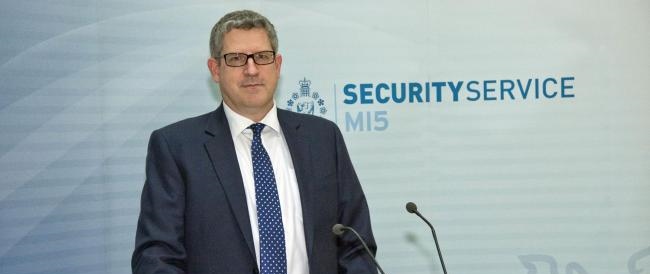MI5 Chief speaks against Russia
May 15, 2018 | Expert Insights

UK’s MI5 Chief Andrew Parker has claimed that Moscow is the prime source of hybrid threats to Europe. Parker said that Russia is carrying out "aggressive and pernicious actions" and risks becoming an "isolated pariah."
Tensions between Moscow and the West have increased since the poisoning of British Spy Sergei Skripal earlier this year.
Background
In recent years, Western nations have accused Russia of conducting covert operations to influence democratic outcomes. According to US intelligence agencies, the Kremlin has interfered in the 2016 presidential elections. Russia is said to have hacked the servers of the Democratic National Committee (DNC) and the personal email account of John Podesta, the chairman of Hillary Clinton’s campaign. The data obtained from these hacks was allegedly forwarded to Wikileaks. According to a report released by the US intelligence community in January 2017, this hack served to “undermine public faith in the U.S. democratic process, denigrate Secretary Clinton, and harm her electability and potential presidency.”
The UK government has accused Russia of hacking elections and it has also been implicated in the alleged hacks that took place during the French presidential elections. The US and the UK have also accused Kremlin of orchestrating the “NotPetya” cyber-attacks that took place last year. In 2017, the US Department of Homeland Security ordered all government agencies and departments to stop using Kaspersky, a security software developed by the Russian multinational company Kaspersky Lab.
Earlier this year, UK, France, and the US, among other nations, have accused Russia of poisoning a British spy who previously had Kremlin ties. UK Prime Minister Theresa May stated that the nerve agent originated in Russia, and that it is “highly likely” that Kremlin was behind the attack. The spy poisoning incident was followed by a diplomatic falling-out when the UK, US and a number of allies expelled over 100 Russian diplomats with supposed intelligence links from their soil. Russia retaliated by expelling an equal number of diplomats.
Russia has also locked horns with Western democracies in Syria. In April 2018, UK, France, and the US conducted coordinated missile strikes in Syria in response to an alleged chemical attack orchestrated by the government. Russia, a staunch ally of the Assad government, warned that any sustained attacks could potentially result in war.
Analysis
In a recent address to European security chiefs in Berlin, Andrew Parker, head of the UK intelligence agency MI5 warned European democracies that Russia is seeking to undermine them with “malign activities.” This was the first public speech outside Britain by a serving head of MI5. “Our respect for Russia’s people (...) cannot and must not stop us from calling out and pushing back on the Kremlin’s flagrant breaches of international rules,” he said.
“The Russian state’s now well-practised doctrine of blending media manipulation, social media disinformation and distortion along with new and old forms of espionage, and high-levels of cyber-attacks, military force and criminal thuggery is what is meant these days by the term hybrid threats,” Parker added. He cited the nerve attack in Salisbury and noted that Russian propaganda after the attack had proposed 30 alternative theories, including ones that alleged that the UK itself was responsible for the attack.
Parker emphasised the need "to shine a light through the fog of lies, half-truths, and obfuscation that pours out of their propaganda machine." Parker added that ISIS was a continued threat to the UK and Europe, claiming that British security had blocked 12 terrorist plots since March 2017. He also stressed that while the UK was leaving the EU, continued security cooperation within Europe was crucial.
Chief of German intelligence Hans-Georg Maassen said that there was a “high likelihood” that the Russian government was behind a cyber-attack on German computer networks. EU Security Commissioner Julian King warned against state actor’s abilities to spread disinformation on social media.
Counterpoint
Russian media such as RT has claimed that the primary purpose of this address was to ensure UK’s continued relationship with European security forces post-Brexit. After the speech, the UK Russian embassy responded on twitter to Parker’s “fog of lies” comment, stating, "By the way, it's Britain that is notorious for fogs." RT is currently under investigation by the British media regulator over potential impartiality breaches.
Russia has repeatedly stated that it wasn’t behind the influence campaign conducted during the US Presidential elections and has maintained its innocence over the nerve attacks. Failure to directly attribute the nerve agent to Russia has raised questions about whether the UK was too quick to point fingers at Moscow. The UK has been unable to clearly justify its allegations thus far.
Russia has accused the West of using "open lies and disinformation", “groundless” accusations and conducting “a Russophobic campaign” to create division in the world. Moscow has denied its involvement in the NotPetya attacks and denied that it attempted to block investigations into the use of chemical weapons in Syria.
Assessment
Our assessment is that ties between Russia and the West are at an almost unprecedented low. It is possible that the UK is keen to guarantee that it remains a part of the EU intelligence circuit after 2019. Having a common “enemy” could help ensure this. As stated previously, we believe that Russia will continue to refute allegations that it is involved in malign activity overseas. With Putin re-elected into office until 2026, Russia’s foreign policy towards the West may be unlikely to undergo drastic change.








Comments